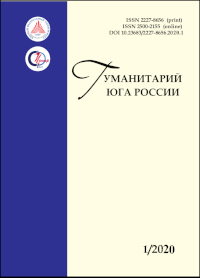Формирование идентичности национально – государственной журналистики в социокультурном пространстве России
Аннотация
Литература
Балынская Н.Р., Жаде З.А. [и др.]. Информационная сущность процесса идентификации российского социума // Проблема идентичности российского социума в условиях глобализации. Саарбрюккен, Германия: LAP LAMBERT Academic Publishing, 2011.
«Власть, зеркало или служанка?» : энциклопедия жизни современной российской журналистики : в 2 т. М.: Изд-е Союза журналистов России, 1998. Т. 2.
Гаман-Голутвина О.В. Профессиональная идентичность политологов: коллективное измерение // Идентичность: личность, общество, политика / ред. И.С. Семененко. М.: Весь мир, 2017.
Головлева Е.Л. Массовые коммуникации и медиапланирование : учеб. пособие. М.: Академический проект, 2009.
Дробижева Л.М. Этничность в социально-политическом пространстве Российской Федерации: опыт 20 лет. М.: Новый хронограф, 2013.
Делягин М.Г. Драйв человечества. Глобализация и мировой кризис. М.: Вече, 2008.
Идентичность: личность, общество, политика / ред. И.С. Семененко. М.: Весь мир, 2017.
Интервью с академиком В.Г. Костомаровым // Журналист. 1996. № 8.
Ключевский В.О. Лекция LXIX : Курс русской истории // Соч. : в 9 т. М.: Мысль, 1989. Т. IV.
Ковалева М.М. Отечественные СМИ в поисках самоидентификации // Средства массовой информации в современном мире. СПб.: СПбГУ, 2002.
Коровникова Н.А. Политическая идентичность России: реалии, особенности, перспективы (опыт постсоветского периода) // Вестник РУДН. Политология. 2012. № 4.
Костиков В. Кто сыграл в ящик? // Аргументы и факты. 2019. № 7. C. 13–19.
Костиков В. Игра в жмурки. Как не заблудиться в информационных лабиринтах // Аргументы и факты. 2019. № 34. 21–27 авг.
Почепцов Г.Г. Информация и дезинформация. Киев: Ника-центр, 2001.
Русский язык в средствах массовой информации : круглый стол // Стратегия России. 2012. № 1.
Свитич Л.Г. Феномен журнализма. М.: Икар Москва, 2000.
Семененко И.С. Нация, национальность, национальная идентичность: новые ракурсы научного дискурса // Мировая экономика и международные отношения. 2015. № 11.
Семененко И.С. Политическая идентичность // Идентичность как категория политической науки : словарь терминов и понятий : в 2 т. / отв. ред. И.С. Семененко. М.: РОССПЭН, 2011.
Соловьев А.И. Политические коммуникации : учеб. пособие для студентов вузов / под ред. А. И. Соловьева. М.: Аспект Пресс, 2004.
Поступила: 11.12.2019
Опубликована: 03.03.2020






